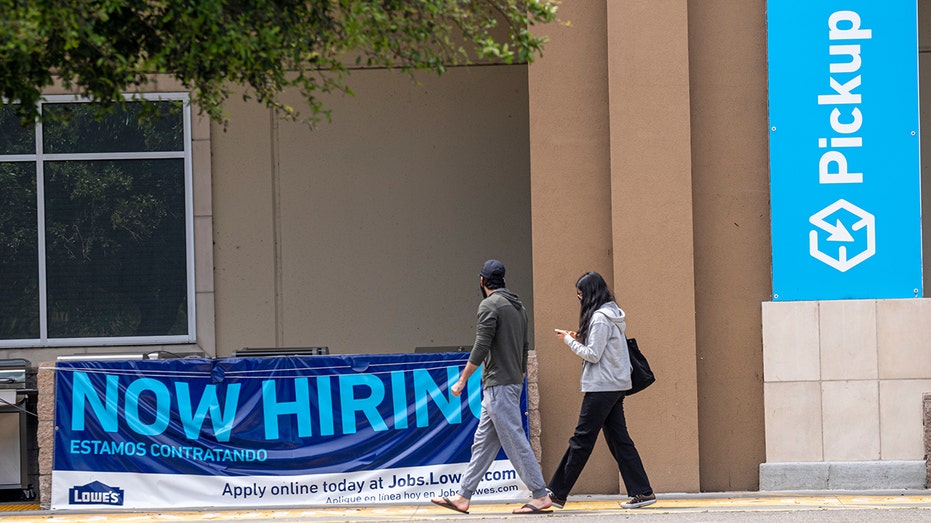May jobs report expected to show hiring waned as White House warned
May's job growth could worsen in a year as worker shortage weighs on businesses
Labor secretary on April jobs report: ‘Opportunity’ to focus on specific states
U.S. Department of Labor Secretary Marty Walsh reacts to the economy adding 428,000 jobs in April, beating estimates by economists.
U.S. job growth likely cooled off in May, suggesting that headwinds from the highest inflation in four decades, global supply chain constraints and a worsening worker shortage are starting to weigh on the labor market.
The Labor Department on Friday morning is releasing its closely watched May jobs report, which is projected to show that payrolls increased by 325,000 last month and the unemployment rate dropped to 3.5%, according to a median estimate by Refinitiv economists. That would mark the worst month for job creation since April 2021, when payrolls grew by 263,000.
"We’ve enjoyed 12 consecutive months of payroll growth north of 400,000, but that streak is close to an end," said Greg McBride, chief financial analyst at Bankrate.
"Job growth will continue, but at a more modest pace in the months ahead as the Federal Reserve works to slow the economy and corral inflation."
BEN BERNANKE ASSESSES THE FED, POWELL AND INFLATION
Signs of a hiring slowdown are already starting to appear. A new Federal Reserve report released this week showed that some businesses are starting to initiate hiring freezes, while the ADP National Employment Report showed that private payroll growth increased by just 128,000, the lowest amount since the pandemic triggered millions of layoffs in April 2020.
One of the biggest problems for businesses is a lack of available workers. Businesses are eager to hire new employees and are raising wages in order to attract workers as they confront a labor shortage. There were roughly 11.4 million open jobs at the end of April — near a record high. The number of Americans quitting their jobs is also near the highest level on record, according to a different government report released Wednesday.
GET FOX BUSINESS ON THE GO BY CLICKING HERE
In total, there is a gap of roughly 5.46 million between job openings and the number of available workers, suggesting the labor market is still extremely tight.
As a result, millions of workers are seeing the largest pay gains in years, as companies compete with one another for a limited number of employees. Many of those gains have been eroded, however, by the hottest inflation in nearly four decades that has pushed the price of everyday necessities like gasoline, clothing and food significantly higher.

A "now hiring" sign outside a Lowe's in Dublin, California, May 11, 2022. (David Paul Morris/Bloomberg via Getty Images / Getty Images)
The rising prices have been bad news for President Biden, who has seen his approval rating plunge as inflation climbs higher. Earlier this week, in a Wall Street Journal op-ed,Biden warned of slowing job growth.
Inflation has also forced the Federal Reserve to move more aggressively. Central bank policymakers raised interest rates by 50-basis points in May for the first time in two decades and have signaled that similar-sized hikes are on the table at coming meetings.
The Fed's increasingly hawkish stance will likely create new burdens for businesses. Hiking interest rates tends to create higher rates on consumer and business loans, which slows the economy by forcing employers to cut back on spending. A growing number of Wall Street firms, including Bank of America, Deutsche Bank and Fannie Mae, are now forecasting an economic recession in the next two years.
CLICK HERE TO READ MORE ON FOX BUSINESS
Former Fed Chairman Ben Bernanke, who led the central bank from 2006 to 2014, has warned that while he thinks policymakers will succeed in taming inflation, he expects unemployment to rise as a result.
Still, Bernanke, speaking last week during a discussion at the Brookings Institution, said he does not anticipate a return to a 1970s-style recession, when unemployment climbed to 10%.
"I am confident, barring some incredibly large new shock, that we’re not anywhere near a Volcker 1981-1982-type situation," he said, referring to the former Fed Chairman Paul Volcker, who shepherded the economy through the ultra-high inflation era in the 1970s.





















